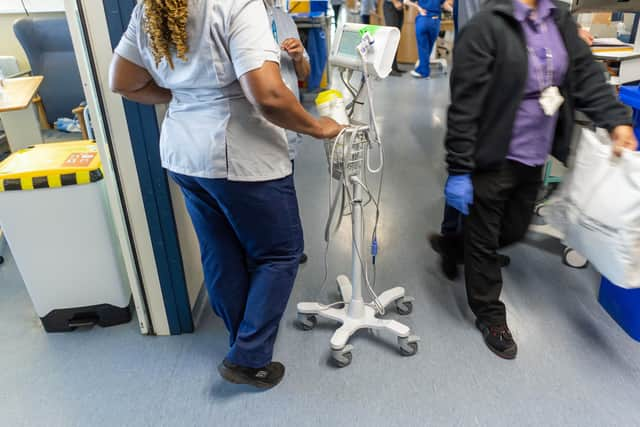Cancer patients are not treated quickly enough at Wigan hospitals to hit target
and live on Freeview channel 276
A leading charity has said the Government needs to pull cancer care out of a "permanent state of crisis".
New figures from NHS England show cancer patients at the Wrightington, Wigan and Leigh Trust (WWL) are not being seen quickly enough.


Advertisement
Hide AdAdvertisement
Hide AdThe NHS states 85 per cent of cancer patients with an urgent referral should start treatment within 62 days.
But NHS England data shows just 69 per cent of cancer patients urgently referred to the Wrightington, Wigan and Leigh Trust in January began treatment within two months of their referral.
That was down from both 79 per cent in December, and 80 per cent in January 2023.
The proportion of patients in England waiting longer than 62 days in January from an urgent suspected cancer referral or consultant upgrade to their first definitive treatment for cancer was 62 per cent, down from 66 per cent in December and below the target of 85 per cent.
Advertisement
Hide AdAdvertisement
Hide AdWWL Interim Chief Operating Officer Claire Wannell said: “Ensuring our patients can receive the level of care they need is incredibly important to us and we recognise that any wait for referral, and then subsequent treatment, can be a very stressful time for our patients and their loved ones.
“Whilst January’s figures were not as high as previous months, due to the effect of annual leave, Bank Holidays, industrial action and patients opting to postpone treatment over the Christmas period, WWL continued to be the second highest performing Trust for 62 day waits from referral to first treatment, across Greater Manchester and above the national average.
“WWL is continuing to work hard to make sure that patients are seen and treated as soon as possible, and we are dedicated to meeting the Faster Diagnostic Standard target, meaning 75 per cent of people on certain cancer-related referrals must receive either a diagnosis or the all-clear within 28 days.”
But commenting on the national situation, Minesh Patel, head of policy at Macmillan Cancer Support, said these delays "can’t go on".
Advertisement
Hide AdAdvertisement
Hide Ad"Healthcare professionals are doing all they can but are working in a permanent state of crisis," he added.
"If the UK Government acts now, we can turn this around and ensure our cancer system is fit for purpose in the years to come.
"We need a long-term cancer strategy in England that provides the investment and focus needed so that everybody with a cancer diagnosis gets the timely and quality care they deserve."
Prof Pat Price, who co-founded the #CatchUpWithCancer campaign, described the situation as "a disaster for cancer patients" and called for "a radical new cancer plan and a clear implementation plan to improve waiting times and cancer survival".
Advertisement
Hide AdAdvertisement
Hide AdA separate NHS target aims for 75 per cent of patients with suspected cancer to be diagnosed or have the disease ruled out within 28 days – at the Wrightington, Wigan and Leigh Trust, 77 per cent of patients were seen within that timeframe.
Across England, 71 per cent of patients urgently referred were given a conclusive diagnosis, down from 74 per cent the previous month and below the target of 75.
GPs across England made 250,000 urgent cancer referrals in the month: up from 220,000 in December and 228,000 in January 2023.
